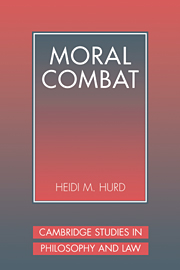Book contents
- Frontmatter
- Contents
- Preface
- Acknowledgments
- Part I The Dilemma of Legal Perspectivalism
- Part II Sources of the Dilemma of Legal Perspectivalism
- 2 The Rejection of Moral Relativism
- 3 The Indefensibility of Practical Authority
- 4 The Failure of Influential Authority
- 5 The Limits of Advisory Authority
- 6 A Defense of Theoretical Authority
- Part III The Moral Case for Legal Perspectivalism
- Part IV The Moral Case Against Legal Perspectivalism
- Part V Resolving the Dilemma of Legal Perspectivalism
- Bibliography
- Index
2 - The Rejection of Moral Relativism
Published online by Cambridge University Press: 05 November 2011
- Frontmatter
- Contents
- Preface
- Acknowledgments
- Part I The Dilemma of Legal Perspectivalism
- Part II Sources of the Dilemma of Legal Perspectivalism
- 2 The Rejection of Moral Relativism
- 3 The Indefensibility of Practical Authority
- 4 The Failure of Influential Authority
- 5 The Limits of Advisory Authority
- 6 A Defense of Theoretical Authority
- Part III The Moral Case for Legal Perspectivalism
- Part IV The Moral Case Against Legal Perspectivalism
- Part V Resolving the Dilemma of Legal Perspectivalism
- Bibliography
- Index
Summary
The first presupposition of the dilemma of legal perspectivalism is that moral relativism is an indefensible account of the nature of morals. Were it otherwise, the correspondence thesis would be false and the dilemma posed in Chapter 1 would be illusory. Recall that the correspondence thesis asserts that the justifiability of an action determines the justifiability of permitting or preventing that action. The defense of this thesis relies on two claims. The first claim is that the reasons for action that determine the morality of conduct are objective, in the sense that their right-making characteristics are universal. If it is right for an actor to do an act, it must be right for all others that she do it. The second claim is that, where other persons face a choice between alternative actions that will or will not thwart the actor's course of conduct, the Tightness of the actor's conduct entails the wrongness of any actions that will thwart it.
If relativism provides the best understanding of the nature of normative judgments, then the first claim upon which the defense of the correspondence thesis rests must be false, and the dilemma of legal perspectivalism must be without bite. After all, if the morality of an action is relative to the beliefs of either individuals or communities, then, inasmuch as the beliefs of persons and the conventions of communities can differ, so too can the morality of similar or codependent actions. It is simply false that reasons for action are objective, in the sense that their right-making characteristics are universal.
- Type
- Chapter
- Information
- Moral CombatThe Dilemma of Legal Perspectivalism, pp. 27 - 61Publisher: Cambridge University PressPrint publication year: 1999

